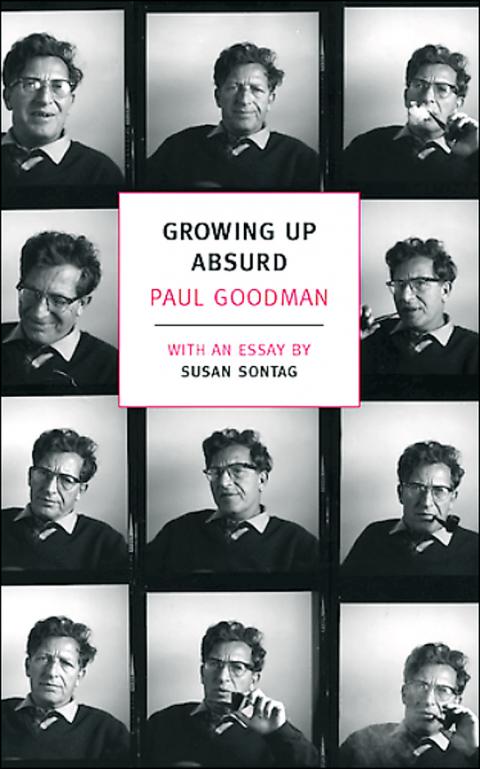The New York Review of Books’ publishing division continues to re-issue neglected classics from the latter half of the last century, and one of the latest is Paul Goodman’s Growing Up Absurd. First published in 1960, it’s an assault on American society, and by implication a defense of the Beats whose pioneering cultural products had only recently appeared — Kerouac’s On the Road came out in 1957 and The Dharma Bums in 1958, while Ginsberg had given his ground-breaking reading of the first part of Howl in 1955.
Goodman was an academic and journalist, and he made his name with this book. He begins, rather tangentially, by discussing jobs and saying there was little employment available that could give the young true satisfaction. He then launches into an attack on a wide variety of American 1950s phenomena, from “organization men,” the rat-race, hostility to progressive education, the ugliness and conformity of most towns, to racial segregation, mass culture, Hollywood, Madison Avenue and Wall Street.
By comparison, he argues, the Beats were in the process of evolving a form of communal living faithful to many ancient traditions, and embodying a radical idealism that was rare indeed in mainstream society.

From the view-point of 1960, of course, Goodman couldn’t have seen what was to come — the taking up of this “alternative” form of society by literally millions, both in the US and worldwide. Two million of these young people, by now styled “hippies,” marched on Washington DC in protest against the Vietnam War, and effectively brought that war to an end through the pro-peace social attitudes they popularized. The Pentagon, it could be argued, through its involvement in the addiction of today’s young to computer war-games, has been busy making sure such a thing never happens again.
Goodman can’t be considered an unequivocal precursor of those times, however, and this book is a strange mixture of prophesy and conservatism. But the 1960s counter-culture was also remarkably traditional in many ways, having no time for artistic modernism, preferring folk music and old-fashioned handicrafts to 12-tone music and expressionism.
Goodman is more concerned to counter the widespread belief that the Beats were a form of juvenile delinquents than to argue for pacifism (which he prematurely says the young had failed to take to), let alone the supposedly beneficial effects of psychedelic drugs. He also demonstrates, in his book review of On the Road printed here as an appendix, that he dislikes both Kerouac and Ginsberg. Even so, in its combination of anarchist utopianism and cultural conservatism, Growing up Absurd stands out as an analysis that later writers such as Norman O. Brown and Herbert Marcuse were only too happy to follow.
With the benefit of hindsight, though, we’re able to see things more clearly. Firstly, the 1960s counter-culture reversed wholesale almost every aspect of 1950s mainstream America. For Christianity it substituted Zen Buddhism, for a belief in nuclear weapons as defending “American values” it substituted a solidly anti-war stance, for alcohol it substituted psychedelic drugs, for meat-eating it substituted vegetarianism, for suits and ties it substituted flowery robes and tied-back hair, and for classical music and sentimental crooners it substituted rock‘n’roll and its many off-shoots.
In order to look at its belief systems in more detail, it’s useful to go back to an even earlier era. In 1935 Malcolm Cowley published a book about the “lost generation” of American writers and artists who’d gone to Europe, notably Paris, in search of a better life. Called Exile’s Return, it listed eight principles that guided their actions. All of these re-appeared in the 1960s, making them look like a credo for bohemians of all generations.
They were: (1) Salvation by the child, or play rather than the Protestant work ethic; (2) Self-expression rather than social conformity; (3) Paganism rather than Christianity; (4) Living for the moment rather than accumulating wealth; (5) Liberty rather than white-collar conformity; (6) Female equality; (7) Psychological adjustment, meaning sexual liberation; and (8) Changing place, i.e. living abroad in pre-modern societies.
Sex was especially important to Goodman. In his own life he was an open bisexual, and lost several university jobs because of it. He would cruise the New York waterfront propositioning handsome young men, but also married and was devastated when his son died in a hiking accident. But sex “costs nothing, [and] needs only health and affection,” he wrote.
And marriage, he considered, failed people as an institution most of the time. “If many marriages could simply let themselves dissolve after a few years,” he writes, “the partners would suddenly become brighter, rosier, and younger.” This may be true for men, but the situation is surely more problematic for women. And indeed the main criticism leveled at this book has been that it routinely ignores the female perspective.
Another shortcoming involves narcotics. Goodman mentions them in a somewhat embarrassed way, as if they’re a feature of Beat life that he’d rather not have to deal with. But the truth is that marijuana in particular was at the heart of the 1960s revolt as it was shortly to develop. Its use united all the different factions, and it’s arguable that it was responsible for a different way of seeing the world. Timothy Leary and Aldous Huxley independently came to the conclusion that psychedelics in general worked by de-conditioning people. You’d been brought up, say, to believe in side-partings and supermarket food, but this sort of conditioning was undermined by marijuana use and you began to see the society you were living in with fresh eyes. The doors of perception were opened, as Huxley wrote, quoting William Blake.
Whether such an optimistic analysis proved true in the long term is another matter. Many would argue that the early feeling of revelation quickly turned into lassitude and the repetition of tired cliches. But this was all still to come. Goodman, meanwhile, wrote an analysis from the viewpoint of 1960 that was perceptive for its time, and is still worth reading.

“Why does Taiwan identity decline?”a group of researchers lead by University of Nevada political scientist Austin Wang (王宏恩) asked in a recent paper. After all, it is not difficult to explain the rise in Taiwanese identity after the early 1990s. But no model predicted its decline during the 2016-2018 period, they say. After testing various alternative explanations, Wang et al argue that the fall-off in Taiwanese identity during that period is related to voter hedging based on the performance of the Democratic Progressive Party (DPP). Since the DPP is perceived as the guardian of Taiwan identity, when it performs well,

The Taiwan People’s Party (TPP) on May 18 held a rally in Taichung to mark the anniversary of President William Lai’s (賴清德) inauguration on May 20. The title of the rally could be loosely translated to “May 18 recall fraudulent goods” (518退貨ㄌㄨㄚˋ!). Unlike in English, where the terms are the same, “recall” (退貨) in this context refers to product recalls due to damaged, defective or fraudulent merchandise, not the political recalls (罷免) currently dominating the headlines. I attended the rally to determine if the impression was correct that the TPP under party Chairman Huang Kuo-Chang (黃國昌) had little of a

At Computex 2025, Nvidia CEO Jensen Huang (黃仁勳) urged the government to subsidize AI. “All schools in Taiwan must integrate AI into their curricula,” he declared. A few months earlier, he said, “If I were a student today, I’d immediately start using tools like ChatGPT, Gemini Pro and Grok to learn, write and accelerate my thinking.” Huang sees the AI-bullet train leaving the station. And as one of its drivers, he’s worried about youth not getting on board — bad for their careers, and bad for his workforce. As a semiconductor supply-chain powerhouse and AI hub wannabe, Taiwan is seeing

Jade Mountain (玉山) — Taiwan’s highest peak — is the ultimate goal for those attempting a through-hike of the Mountains to Sea National Greenway (山海圳國家綠道), and that’s precisely where we’re headed in this final installment of a quartet of articles covering the Greenway. Picking up the trail at the Tsou tribal villages of Dabang and Tefuye, it’s worth stocking up on provisions before setting off, since — aside from the scant offerings available on the mountain’s Dongpu Lodge (東埔山莊) and Paiyun Lodge’s (排雲山莊) meal service — there’s nowhere to get food from here on out. TEFUYE HISTORIC TRAIL The journey recommences with